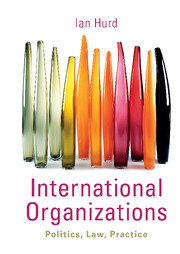Book contents
- Frontmatter
- Contents
- Preface
- Acknowledgement
- 1 Introduction to international organizations
- 2 A guide to the study of international organizations
- 3 The World Trade Organization
- 4 The International Monetary Fund and the World Bank
- 5 The United Nations I
- 6 The United Nations II
- 7 The International Labor Organization
- 8 The International Court of Justice
- 9 The International Criminal Court
- 10 Regional Organizations
- 11 Conclusion
- Index
3 - The World Trade Organization
- Frontmatter
- Contents
- Preface
- Acknowledgement
- 1 Introduction to international organizations
- 2 A guide to the study of international organizations
- 3 The World Trade Organization
- 4 The International Monetary Fund and the World Bank
- 5 The United Nations I
- 6 The United Nations II
- 7 The International Labor Organization
- 8 The International Court of Justice
- 9 The International Criminal Court
- 10 Regional Organizations
- 11 Conclusion
- Index
Summary
Key facts
Website: www.wto.int
Members: 153 members, including some that are not states.
Main bodies:
Ministerial Conference: annual meeting of trade ministers.
General Council: plenary body of trade officials, meets in various guises to consider trade in goods, trade in services, trade in agriculture, intellectual property, and so on.
Dispute Settlement Body: General Council session to consider trade disputes.
many Working Groups, Working Parties, and Committees.
Area of competence:
sets limits on what policies members can choose that have an impact on international trade.
strives to create a stable regulatory environment for international trade.
aims for “rule-governed” trade, rather than free trade.
settles disputes between members regarding violations of these rules, and authorizes retaliatory tariffs under the Dispute Settlement Understanding.
Principal obligations of members:
“most-favored nation”: generally treat goods from all trade partners the same (Art. I), qualified by many other rules.
“schedule of concessions”: maintain a public and fixed set of tariffs for imports (Art. II).
“national treatment”: treat imports no worse than domestically produced goods (Art. III).
The World Trade Organization enforces a set of rules limiting the choices of governments with respect to international trade. These rules define what is legal and illegal when it come to a wide range of state policies that might affect international trade, including import tariffs, industrial subsidies, and all manner of taxes and regulations. For WTO member countries, any government policy that might have an impact on private firms that trade across its borders could conceivably come under the scrutiny of the organization.
- Type
- Chapter
- Information
- International OrganizationsPolitics, Law, Practice, pp. 37 - 65Publisher: Cambridge University PressPrint publication year: 2010



